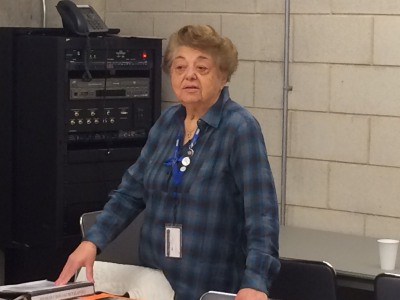 |
| Mrs. Magda Brown, speaking to my students at the Illinois Holocaust Museum |
“I thought that the entire world was in the boxcar. I could not understand how there was a free man, shepherding his flock.” These words are Mrs. Magda Brown’s; she was 17 when the event she recollects took place. The train that was shipping her to Auschwitz-Birkenau was just crossing the beautiful Carpathian mountains into Poland–or into what used to be Poland. The young teenager Magda had been standing the whole time since the departure from Budapest. The trains were filled with people who were scared, hungry and thirsty, having no idea where they were taken, and being treated without any consideration for their humanity. When she, by chance, reached the small window of the boxcar, she saw the beauty of nature and a lonely shepherd; and she was shocked. How could someone be free since it felt as if the entire world was captive in the trains that were marching to Auschwitz?
Whenever I listen to Mrs. Magda Brown’s story about her experiences as a Holocaust survivor, a novel aspect touches me (see her website, Magda Brown, here). I think I have heard her speak six times, but it is only this sixth time that the episode with the free man in the mountains stayed with me. She may have not mentioned it before, or I may have been so touched by her description of what it means to fully concentrate on only one thought, “If I could just have a drop of water,” that I may have missed it. But now, on the occasion of a new visit with students at the Illinois Holocaust Museum, this image touched me.
One may ask the question why the world did not stop when such atrocities took place. But there is also something else that Mrs. Brown’s words inspire: how many times are we unaware of the trains of despair that pass by us? How many times am I unaware of the trains that take my brethren to their dooms, while actually believing that I am a good shepherd?
We are all contemporaries, but we each live into such different worlds, and we rarely fully participate in the life of another, be it for joy or pain. However, that shepherd, taking care freely of his flock in the Carpathian mountains, belonged to the same reality in which thousands of people were treated like cattle and sent to Auschwitz. He belonged to the same reality in which other thousands were sent in similar boxcars to Siberia.
Of course, one can hardly believe that we can take upon ourselves all the pains of the world. But we can take upon ourselves to do that which we can. Perhaps to take care of the sheep on the mountains. Perhaps to bake bread in a bakery over night. Perhaps to dedicate all energy to educate the youth that “Genocide doesn’t happen suddenly,” as Magda Brown often says in her speeches (and I use here the words from her website). “It builds gradually and we need to learn from our own mistakes. With my testimony, I hope I can bring a face–something human–to anyone who listens to me, so they can see and learn.”
May we all be free shepherds.